Exploring HRD: Learning Programs, Strategic Impact, and Assessments
VerifiedAdded on 2023/06/11
|6
|1428
|357
Essay
AI Summary
This essay provides a reflection on Human Resource Development (HRD), emphasizing its role in managing and coordinating learning programs within organizations. It explores the strategic and tactical contributions of HRD to organizational development, focusing on creating a learning environment and addressing training gaps. The essay also discusses the concept of a learning organization and the importance of scoring, formative, and summative assessments in employee development. It concludes that HRD plays a crucial role in enhancing employee productivity and fostering a culture of continuous learning and improvement, which is vital for organizational success. Desklib provides access to similar solved assignments and resources for students.
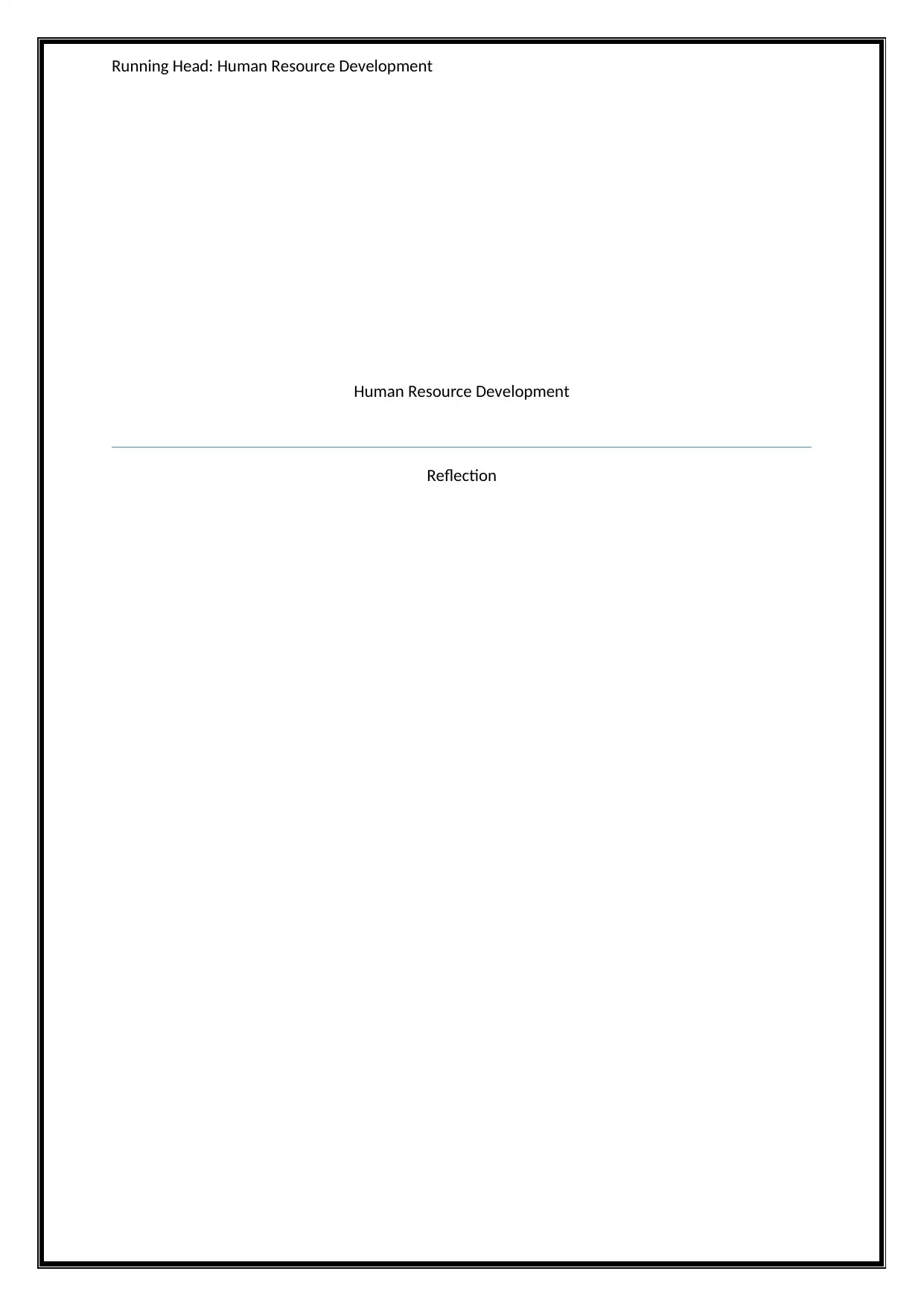
Running Head: Human Resource Development
Human Resource Development
Reflection
Human Resource Development
Reflection
Paraphrase This Document
Need a fresh take? Get an instant paraphrase of this document with our AI Paraphraser
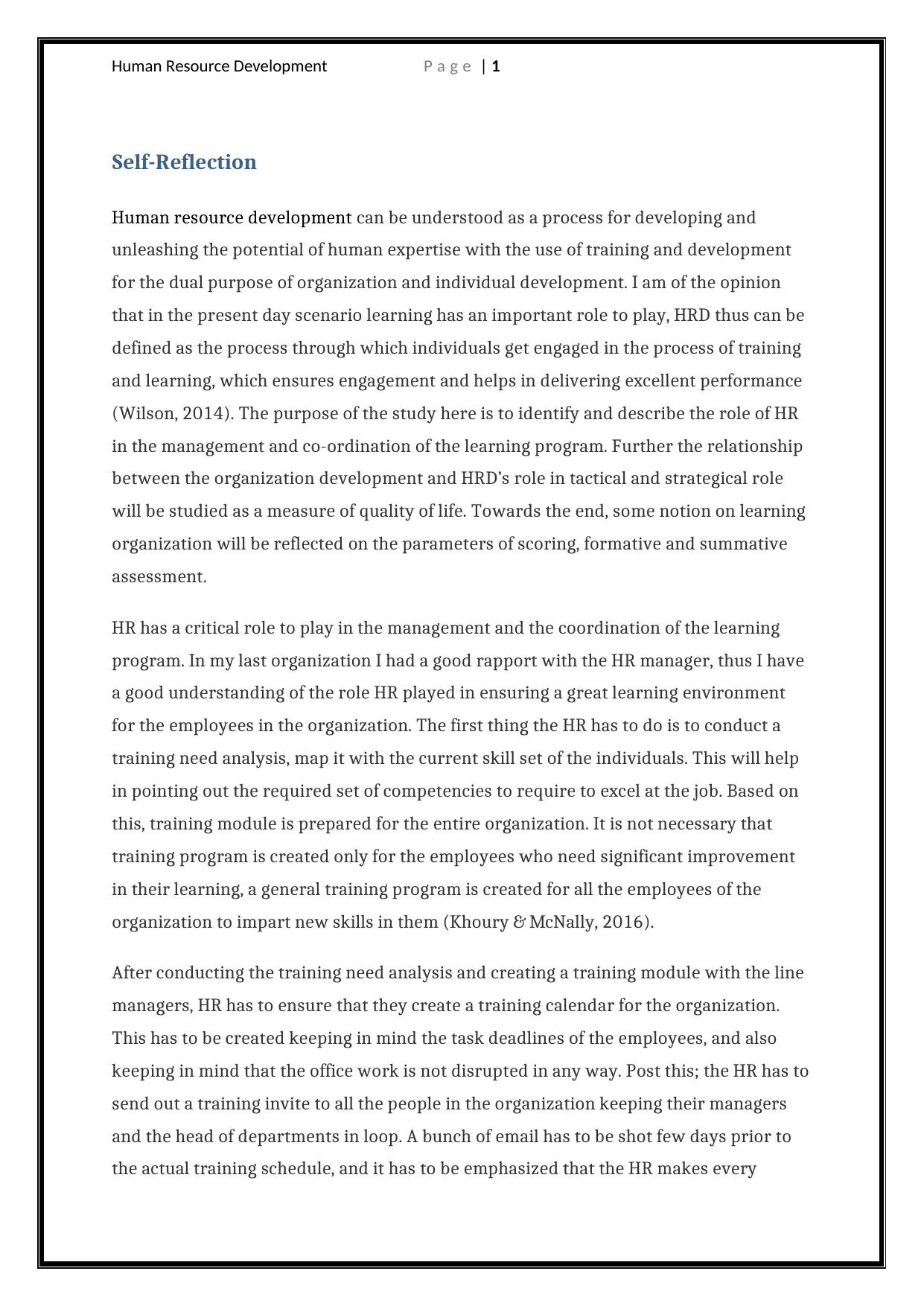
Human Resource Development P a g e | 1
Self-Reflection
Human resource development can be understood as a process for developing and
unleashing the potential of human expertise with the use of training and development
for the dual purpose of organization and individual development. I am of the opinion
that in the present day scenario learning has an important role to play, HRD thus can be
defined as the process through which individuals get engaged in the process of training
and learning, which ensures engagement and helps in delivering excellent performance
(Wilson, 2014). The purpose of the study here is to identify and describe the role of HR
in the management and co-ordination of the learning program. Further the relationship
between the organization development and HRD’s role in tactical and strategical role
will be studied as a measure of quality of life. Towards the end, some notion on learning
organization will be reflected on the parameters of scoring, formative and summative
assessment.
HR has a critical role to play in the management and the coordination of the learning
program. In my last organization I had a good rapport with the HR manager, thus I have
a good understanding of the role HR played in ensuring a great learning environment
for the employees in the organization. The first thing the HR has to do is to conduct a
training need analysis, map it with the current skill set of the individuals. This will help
in pointing out the required set of competencies to require to excel at the job. Based on
this, training module is prepared for the entire organization. It is not necessary that
training program is created only for the employees who need significant improvement
in their learning, a general training program is created for all the employees of the
organization to impart new skills in them (Khoury & McNally, 2016).
After conducting the training need analysis and creating a training module with the line
managers, HR has to ensure that they create a training calendar for the organization.
This has to be created keeping in mind the task deadlines of the employees, and also
keeping in mind that the office work is not disrupted in any way. Post this; the HR has to
send out a training invite to all the people in the organization keeping their managers
and the head of departments in loop. A bunch of email has to be shot few days prior to
the actual training schedule, and it has to be emphasized that the HR makes every
Self-Reflection
Human resource development can be understood as a process for developing and
unleashing the potential of human expertise with the use of training and development
for the dual purpose of organization and individual development. I am of the opinion
that in the present day scenario learning has an important role to play, HRD thus can be
defined as the process through which individuals get engaged in the process of training
and learning, which ensures engagement and helps in delivering excellent performance
(Wilson, 2014). The purpose of the study here is to identify and describe the role of HR
in the management and co-ordination of the learning program. Further the relationship
between the organization development and HRD’s role in tactical and strategical role
will be studied as a measure of quality of life. Towards the end, some notion on learning
organization will be reflected on the parameters of scoring, formative and summative
assessment.
HR has a critical role to play in the management and the coordination of the learning
program. In my last organization I had a good rapport with the HR manager, thus I have
a good understanding of the role HR played in ensuring a great learning environment
for the employees in the organization. The first thing the HR has to do is to conduct a
training need analysis, map it with the current skill set of the individuals. This will help
in pointing out the required set of competencies to require to excel at the job. Based on
this, training module is prepared for the entire organization. It is not necessary that
training program is created only for the employees who need significant improvement
in their learning, a general training program is created for all the employees of the
organization to impart new skills in them (Khoury & McNally, 2016).
After conducting the training need analysis and creating a training module with the line
managers, HR has to ensure that they create a training calendar for the organization.
This has to be created keeping in mind the task deadlines of the employees, and also
keeping in mind that the office work is not disrupted in any way. Post this; the HR has to
send out a training invite to all the people in the organization keeping their managers
and the head of departments in loop. A bunch of email has to be shot few days prior to
the actual training schedule, and it has to be emphasized that the HR makes every
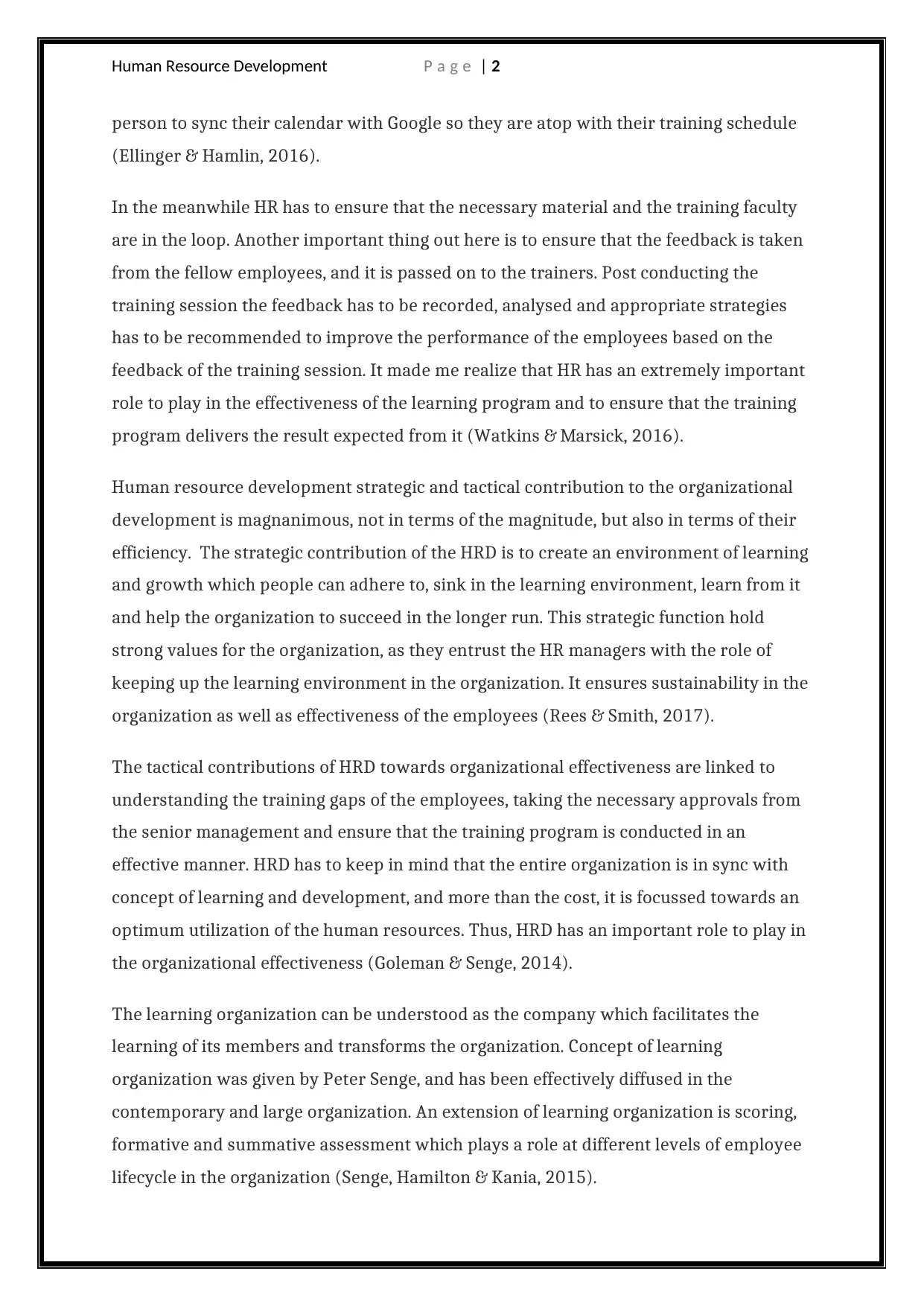
Human Resource Development P a g e | 2
person to sync their calendar with Google so they are atop with their training schedule
(Ellinger & Hamlin, 2016).
In the meanwhile HR has to ensure that the necessary material and the training faculty
are in the loop. Another important thing out here is to ensure that the feedback is taken
from the fellow employees, and it is passed on to the trainers. Post conducting the
training session the feedback has to be recorded, analysed and appropriate strategies
has to be recommended to improve the performance of the employees based on the
feedback of the training session. It made me realize that HR has an extremely important
role to play in the effectiveness of the learning program and to ensure that the training
program delivers the result expected from it (Watkins & Marsick, 2016).
Human resource development strategic and tactical contribution to the organizational
development is magnanimous, not in terms of the magnitude, but also in terms of their
efficiency. The strategic contribution of the HRD is to create an environment of learning
and growth which people can adhere to, sink in the learning environment, learn from it
and help the organization to succeed in the longer run. This strategic function hold
strong values for the organization, as they entrust the HR managers with the role of
keeping up the learning environment in the organization. It ensures sustainability in the
organization as well as effectiveness of the employees (Rees & Smith, 2017).
The tactical contributions of HRD towards organizational effectiveness are linked to
understanding the training gaps of the employees, taking the necessary approvals from
the senior management and ensure that the training program is conducted in an
effective manner. HRD has to keep in mind that the entire organization is in sync with
concept of learning and development, and more than the cost, it is focussed towards an
optimum utilization of the human resources. Thus, HRD has an important role to play in
the organizational effectiveness (Goleman & Senge, 2014).
The learning organization can be understood as the company which facilitates the
learning of its members and transforms the organization. Concept of learning
organization was given by Peter Senge, and has been effectively diffused in the
contemporary and large organization. An extension of learning organization is scoring,
formative and summative assessment which plays a role at different levels of employee
lifecycle in the organization (Senge, Hamilton & Kania, 2015).
person to sync their calendar with Google so they are atop with their training schedule
(Ellinger & Hamlin, 2016).
In the meanwhile HR has to ensure that the necessary material and the training faculty
are in the loop. Another important thing out here is to ensure that the feedback is taken
from the fellow employees, and it is passed on to the trainers. Post conducting the
training session the feedback has to be recorded, analysed and appropriate strategies
has to be recommended to improve the performance of the employees based on the
feedback of the training session. It made me realize that HR has an extremely important
role to play in the effectiveness of the learning program and to ensure that the training
program delivers the result expected from it (Watkins & Marsick, 2016).
Human resource development strategic and tactical contribution to the organizational
development is magnanimous, not in terms of the magnitude, but also in terms of their
efficiency. The strategic contribution of the HRD is to create an environment of learning
and growth which people can adhere to, sink in the learning environment, learn from it
and help the organization to succeed in the longer run. This strategic function hold
strong values for the organization, as they entrust the HR managers with the role of
keeping up the learning environment in the organization. It ensures sustainability in the
organization as well as effectiveness of the employees (Rees & Smith, 2017).
The tactical contributions of HRD towards organizational effectiveness are linked to
understanding the training gaps of the employees, taking the necessary approvals from
the senior management and ensure that the training program is conducted in an
effective manner. HRD has to keep in mind that the entire organization is in sync with
concept of learning and development, and more than the cost, it is focussed towards an
optimum utilization of the human resources. Thus, HRD has an important role to play in
the organizational effectiveness (Goleman & Senge, 2014).
The learning organization can be understood as the company which facilitates the
learning of its members and transforms the organization. Concept of learning
organization was given by Peter Senge, and has been effectively diffused in the
contemporary and large organization. An extension of learning organization is scoring,
formative and summative assessment which plays a role at different levels of employee
lifecycle in the organization (Senge, Hamilton & Kania, 2015).
⊘ This is a preview!⊘
Do you want full access?
Subscribe today to unlock all pages.

Trusted by 1+ million students worldwide
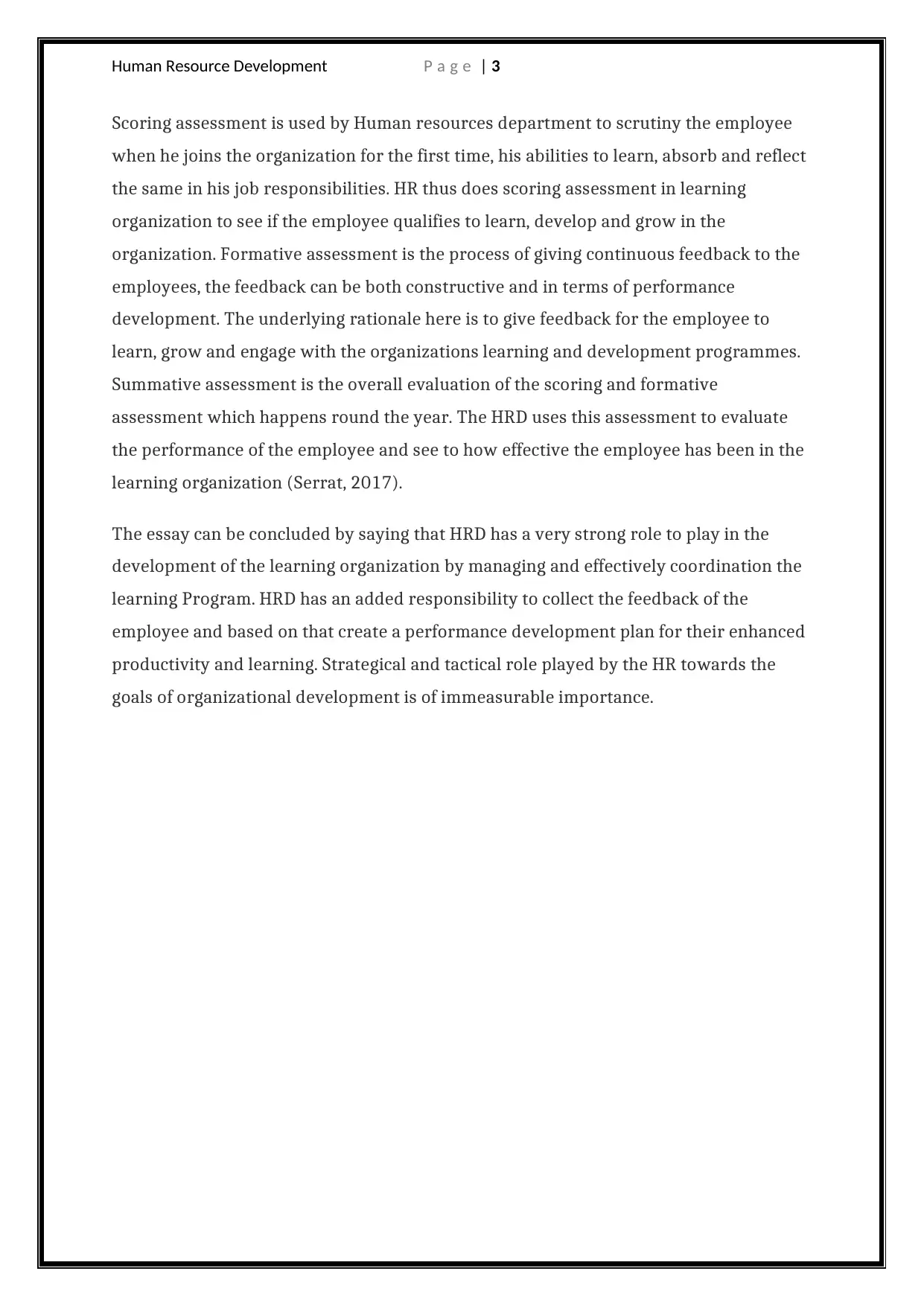
Human Resource Development P a g e | 3
Scoring assessment is used by Human resources department to scrutiny the employee
when he joins the organization for the first time, his abilities to learn, absorb and reflect
the same in his job responsibilities. HR thus does scoring assessment in learning
organization to see if the employee qualifies to learn, develop and grow in the
organization. Formative assessment is the process of giving continuous feedback to the
employees, the feedback can be both constructive and in terms of performance
development. The underlying rationale here is to give feedback for the employee to
learn, grow and engage with the organizations learning and development programmes.
Summative assessment is the overall evaluation of the scoring and formative
assessment which happens round the year. The HRD uses this assessment to evaluate
the performance of the employee and see to how effective the employee has been in the
learning organization (Serrat, 2017).
The essay can be concluded by saying that HRD has a very strong role to play in the
development of the learning organization by managing and effectively coordination the
learning Program. HRD has an added responsibility to collect the feedback of the
employee and based on that create a performance development plan for their enhanced
productivity and learning. Strategical and tactical role played by the HR towards the
goals of organizational development is of immeasurable importance.
Scoring assessment is used by Human resources department to scrutiny the employee
when he joins the organization for the first time, his abilities to learn, absorb and reflect
the same in his job responsibilities. HR thus does scoring assessment in learning
organization to see if the employee qualifies to learn, develop and grow in the
organization. Formative assessment is the process of giving continuous feedback to the
employees, the feedback can be both constructive and in terms of performance
development. The underlying rationale here is to give feedback for the employee to
learn, grow and engage with the organizations learning and development programmes.
Summative assessment is the overall evaluation of the scoring and formative
assessment which happens round the year. The HRD uses this assessment to evaluate
the performance of the employee and see to how effective the employee has been in the
learning organization (Serrat, 2017).
The essay can be concluded by saying that HRD has a very strong role to play in the
development of the learning organization by managing and effectively coordination the
learning Program. HRD has an added responsibility to collect the feedback of the
employee and based on that create a performance development plan for their enhanced
productivity and learning. Strategical and tactical role played by the HR towards the
goals of organizational development is of immeasurable importance.
Paraphrase This Document
Need a fresh take? Get an instant paraphrase of this document with our AI Paraphraser
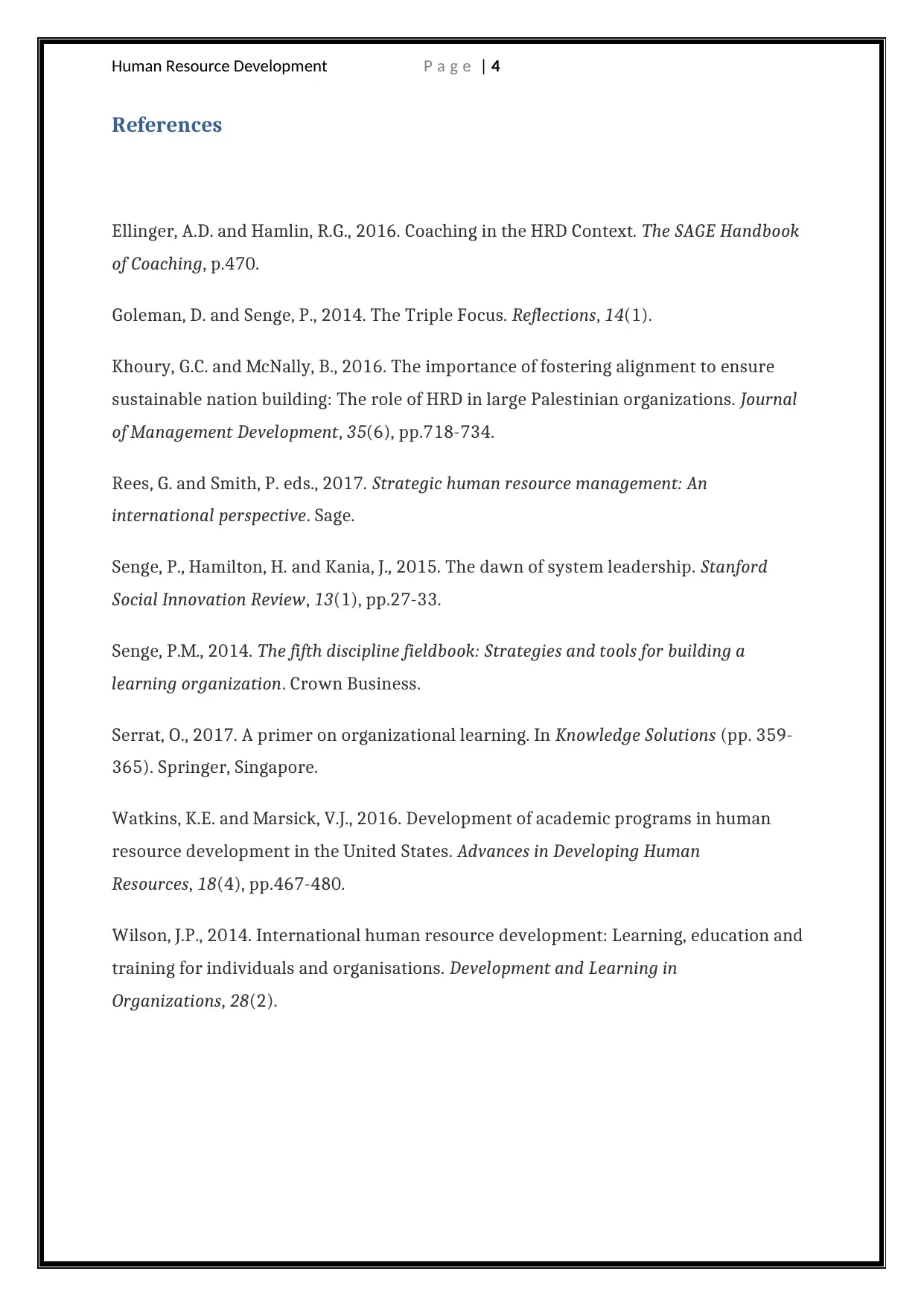
Human Resource Development P a g e | 4
References
Ellinger, A.D. and Hamlin, R.G., 2016. Coaching in the HRD Context. The SAGE Handbook
of Coaching, p.470.
Goleman, D. and Senge, P., 2014. The Triple Focus. Reflections, 14(1).
Khoury, G.C. and McNally, B., 2016. The importance of fostering alignment to ensure
sustainable nation building: The role of HRD in large Palestinian organizations. Journal
of Management Development, 35(6), pp.718-734.
Rees, G. and Smith, P. eds., 2017. Strategic human resource management: An
international perspective. Sage.
Senge, P., Hamilton, H. and Kania, J., 2015. The dawn of system leadership. Stanford
Social Innovation Review, 13(1), pp.27-33.
Senge, P.M., 2014. The fifth discipline fieldbook: Strategies and tools for building a
learning organization. Crown Business.
Serrat, O., 2017. A primer on organizational learning. In Knowledge Solutions (pp. 359-
365). Springer, Singapore.
Watkins, K.E. and Marsick, V.J., 2016. Development of academic programs in human
resource development in the United States. Advances in Developing Human
Resources, 18(4), pp.467-480.
Wilson, J.P., 2014. International human resource development: Learning, education and
training for individuals and organisations. Development and Learning in
Organizations, 28(2).
References
Ellinger, A.D. and Hamlin, R.G., 2016. Coaching in the HRD Context. The SAGE Handbook
of Coaching, p.470.
Goleman, D. and Senge, P., 2014. The Triple Focus. Reflections, 14(1).
Khoury, G.C. and McNally, B., 2016. The importance of fostering alignment to ensure
sustainable nation building: The role of HRD in large Palestinian organizations. Journal
of Management Development, 35(6), pp.718-734.
Rees, G. and Smith, P. eds., 2017. Strategic human resource management: An
international perspective. Sage.
Senge, P., Hamilton, H. and Kania, J., 2015. The dawn of system leadership. Stanford
Social Innovation Review, 13(1), pp.27-33.
Senge, P.M., 2014. The fifth discipline fieldbook: Strategies and tools for building a
learning organization. Crown Business.
Serrat, O., 2017. A primer on organizational learning. In Knowledge Solutions (pp. 359-
365). Springer, Singapore.
Watkins, K.E. and Marsick, V.J., 2016. Development of academic programs in human
resource development in the United States. Advances in Developing Human
Resources, 18(4), pp.467-480.
Wilson, J.P., 2014. International human resource development: Learning, education and
training for individuals and organisations. Development and Learning in
Organizations, 28(2).
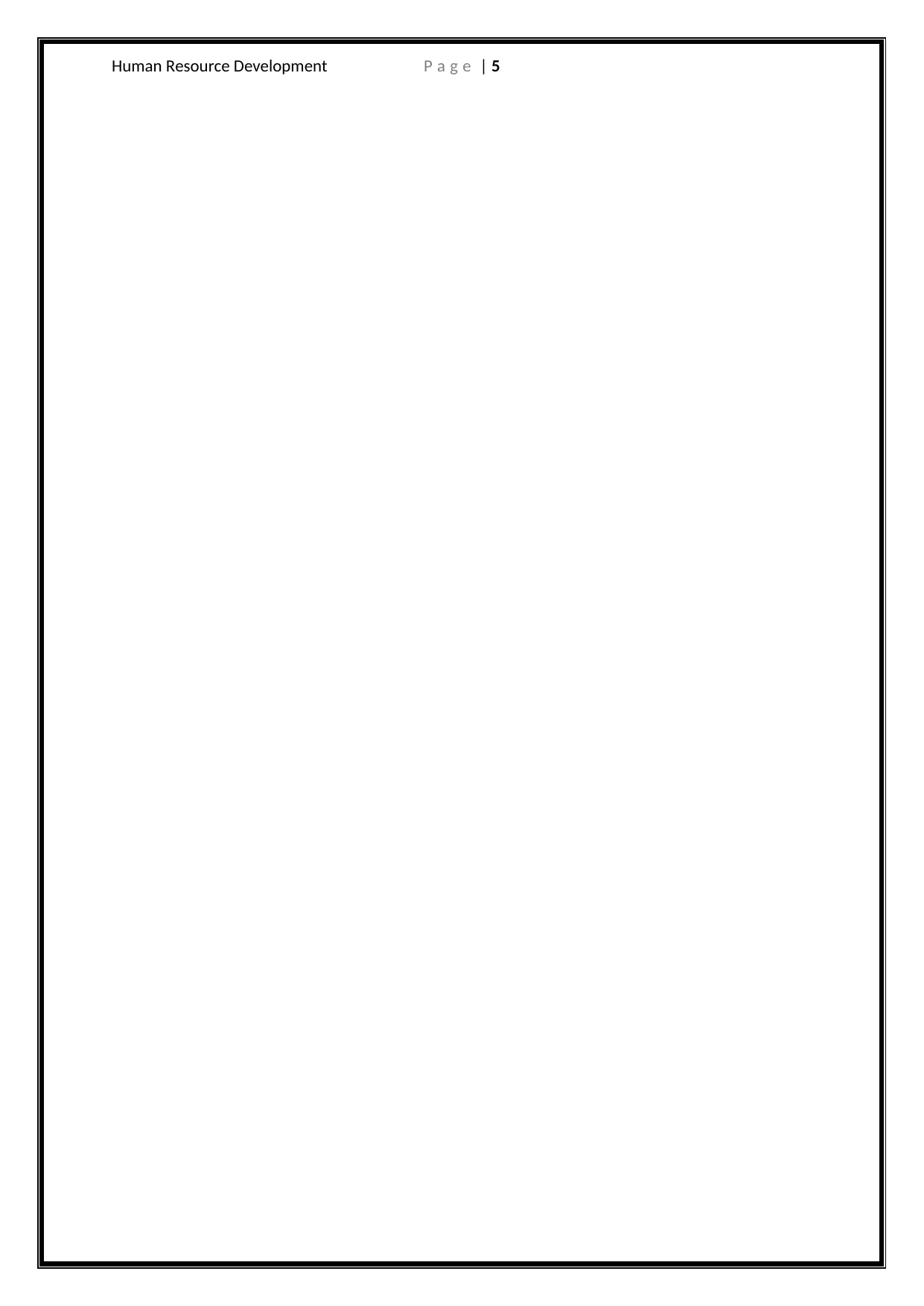
Human Resource Development P a g e | 5
⊘ This is a preview!⊘
Do you want full access?
Subscribe today to unlock all pages.

Trusted by 1+ million students worldwide
1 out of 6
Related Documents
Your All-in-One AI-Powered Toolkit for Academic Success.
+13062052269
info@desklib.com
Available 24*7 on WhatsApp / Email
![[object Object]](/_next/static/media/star-bottom.7253800d.svg)
Unlock your academic potential
Copyright © 2020–2026 A2Z Services. All Rights Reserved. Developed and managed by ZUCOL.




